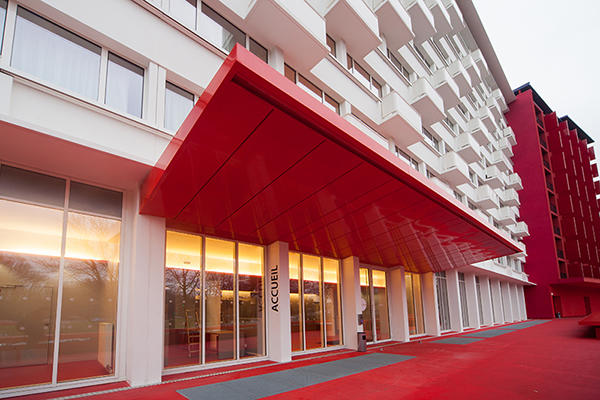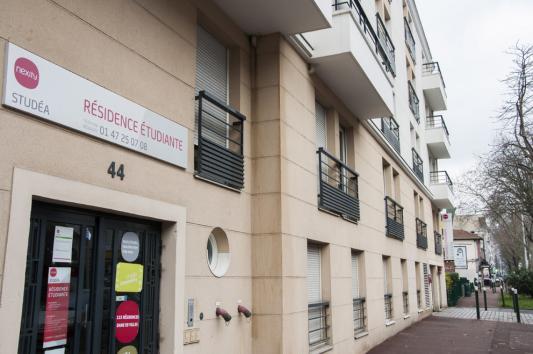What sort of housing is for me? How do I find it? Can I get help paying my rent? What is a guarantor? A lot of questions come up when you start thinking about where to live while studying in France. But don’t worry—we’re with you every step of the way.
For your stay in France, you have many housing options. You can choose between a publicly owned building or a private one, and between a student residence or an apartment that you may occupy alone, with other students, or with a family or local resident. Don’t panic! We’ll decode the various types of housing available to students and help you in your search.
Whatever type of housing you end up choosing, start your search early.
To facilitate your search, we begin by distinguishing between two basic forms of housing for students in France:
-
Student residences and hostels. There are several advantages to housing designed specifically for students or young people: lower rents, furnished rooms, and a built-in social life—all valuable commodities.
-
Rooms and apartments rented on the real-estate market, either through an agency or directly from an individual property owner. Many who take this route share space with other students or rent a room in a local household.
With the exception of CROUS (in the case of housing for recipients of French government scholarships), Campus France has no partnerships with any entity offering student housing or related services. The entities mentioned in this article are cited solely to assist you in your search.
First step: ask your school
Several institutions provide rooms or have partnerships with student residencies or flat agencies. If they do not, they may have useful information to give you as they are probably used to dealing with accommodation requests from students.
After having secured an admission, asking for information from your school can be a good first step. If your school cannot help you, the following paragraphs will do!
Know your options
Student residences and hostels
University residence halls managed by CROUS
The residences managed by France’s regional centers for student services, known as CROUS (centres régionaux des œuvres universitaires et scolaires), are publicly owned and subsidized by the French government. CROUS buildings are the first choice of many students for the advantages they offer : the monthly rent is low (€400 in Paris; €200 on average elsewhere in France) and occupants qualify for housing assistance from CAF (France’s family assistance fund); the buildings are close to campus; and the opportunities for social interaction with other students are plentiful. In fact, the only drawback to CROUS rooms is that they are hard to get, because demand far exceeds supply.

Obtaining a room in a CROUS residence hall
1. The application process for international students varies depending on wether they are on a formal exchange program or they are free movers.
- Free movers: To make a request for a reservation of accommodation in a university residence managed by the CROUS, international students must go directly through the platform trouverunlogement.lescrous.fr from July 12, 2022. You will find all the information and you need to choose your accommodation in a CROUS residence.
- Students on a formal exchange program or Erasmus +: it is the international relations service of your host institution that takes care of booking your accommodation and sending you the procedures.
- Scholarship holders managed by Campus France: Campus France is in charge of booking your accommodation and sending you the procedures.
In these last two cases, it is not necessary to contact the CROUS directly.
2. You can also contact your host higher education institution to ask if they have an agreement with the CROUS for housing solutions.
4. Lokaviz lists all of the units available in CROUS residences, as well as space offered by individual property owners. There’s no cost to review the posted vacancies. All of the units listed on the site have earned the Lokaviz label, so students can be sure they’re renting decent housing.
The international student residence of Paris
Located in the 14e arrondissement of Paris, the Cité internationale universitaire de Paris (CIUP) is a sprawling collection of university residences that house nearly 6,000 students, scholars, scientists, artists, and athletes from all over the world. Room rents vary depending on the amenities provided, the occupant’s age, and the duration of their stay.
To live at CIUP, one must be enrolled at an institution in the Paris region and working on a master’s degree or above. Learn more at the CIUP website under the tab Faire une demande de logement (apply for housing).

Student residences owned and managed by private companies
Privately owned and operated student buildings are a good alternative if you’re not able to get a room through CROUS. The rents are often higher than in CROUS buildings, but they’re competitive with other forms of student housing. The everyday advantages are many: group life, furnished rooms, internet, gym, laundry facilities, etc.
To gain an idea of the space offered in private student residences, check out the websites of the following companies: PARME, Suitétudes, Les Estudines, NEXITY Studéa, Fac-Habitat, Cardinal Campus, Néoresid, Kley, Student Factory.
Safehouse is also an option of housing provider in France and offers regular availability of accommodation to students.
Hostels for students and youth
Run by nonprofits (often religious organizations), most hostels offer lodging for young people between the ages of 18 and 25. Some are single-sex; others are mixed. Priority is usually given to young workers (engaged in apprenticeships, work-study, or practical training) or to students performing internships. But you can apply even if you’re "just a student". Rooms are less expensive than in private student residences. Expect to pay about €500 in Paris; €250 elsewhere. Some hostels offer meal plans.
To learn more, visit the sites of the national union of student houses, the association of youth residences and hostels, and the national union for youth housing.
Housing in the private real-estate market
If you have trouble locating a room in a student residence or hostel, you may want to turn to a real-estate agency or individual property owner. You can rent an apartment for yourself alone or find a room in an apartment or house.
Private apartments and shared rentals
Many students choose to rent an apartment. Those who want to live alone generally opt for a studio. The prices are those that prevail on the open real-estate market. Expect to pay at least €800 in Paris and €400 elsewhere in France.
Several options exist when finding a student flat or a room in a private flat. Among them, Studapart is a secured and helpful platform which acts as a connection between students and property owners according to the needs of each one.
To find notices of apartments offered by real-estate agencies, check Se Loger or, for Paris specifically, Lodgis. To rent an apartment from an individual property owner (without going through an agency), check the listings on the sites De Particulier à Particulier and Le Bon Coin.
Many students elect to rent large apartments and share them with others, a practice known as colocation. In shared rentals, the tenants split the rent as well as the costs of electricity, gas, and internet/telephone service.
Shared rental opportunities are advertised on several sites: appartager, roomlala, immojeune, and la carte des colocs.
Living with a family or an elderly resident
International students wishing to refine their French often choose to live with a French family. It’s a practical and economical solution: You get your own room in a house or apartment while taking part in French daily life and enjoying the comforts and facilities of a permanent home. Some families even offer students free or reduced rent in return for services such as childcare, help with homework, or language lessons.
Learn more from CoHomly, or, for Paris only, France Stay.
You may also want to consider intergenerational housing. Nonprofits match students looking for housing with seniors willing to offer a room in their home in return for the student’s reassuring presence, typically during the evening hours and overnight. Rents are modest and sometimes free.
To learn more, visit the site of the nonprofit Ensemble 2 générations and of the network réseau CoSI, where CoSI stands for intergenerational cohabitation for mutual benefit.
Sealing the deal
Gathering your documentation
The list of documents you’ll need will depend on the type of housing you’ve chosen and the owner’s requirements, but, generally, you should be prepared to provide copies of the following:
- Your ID card,
- Your residency permit (e.g., VLS-TS) if you are in France on a nonresident visa,
- Your student card and proof of enrollment for the current year,
- A letter from your guarantor and proof of the guarantor’s identity.

Finding a guarantor
A guarantor is someone who provides security on your behalf, that is, someone who agrees to pay your rent in the event you can no longer do so. In France, nearly everyone seeking to rent an apartment, whether French or foreign, is asked to name a guarantor.
Your guarantor must be French. If you don’t have one, other solutions are possible, thanks to the VISALE system, which provides rental guarantees if you are renting an apartment or room in a university residence. We advise you to begin the VISALE process as soon as possible—even before arriving in France. You don’t have to know your address in France to obtain a certificate of eligibility for VISALE (known as a “VISALE visa”).
Garant Me is an alternative for those who are not eligible for VISALE or whose landlords do not accept it.
How to read real-estate ads
The number of rooms mentioned in advertisements refers to the amount of “living space” (e.g., bedroom, living room, dining room); it does not include the kitchen, bathroom, or hallways. For example, deux pièces means that the unit has a bedroom and a living room, as well as a kitchen and bathroom.
Here are some of the most common phrases and abbreviations:
- Studio: a single room with a kitchenette
- T2 or F2: a deux pièces, i.e., a bedroom and a living room, as well as a kitchen and bathroom
- T3 or F3: trois pièces—a three-room apartment (usually indicating two bedrooms)
- SdB: bathroom with tub
- Salle d’eau: bathroom with shower
- Appt.: apartment
- RdC: ground floor, street level
- Asc.: elevator
- TBE: very good condition
- CC: charges included. "Charges" cover the costs of maintaining the building (exterior, grounds, common areas) and providing common services (e.g., collecting trash).
Beginning your search
A few tips
- Don’t wait until you arrive in France to look for housing: you will not be able to submit your visa application without a proof of accommodation. Submit your applications remotely, whether for a room in a CROUS building or a private home.
- Beware of rents that seem too good to be true. In Paris, count on spending €400 each month for a room in a CROUS building and at least €800 for a studio on the private market. For other cities, you can divide those figures in half, on average. In most cases, you should be able to obtain some help from the CAF (France’s family assistance fund) in paying your rent.
- Look for furnished rentals. You’ll save on move-in expenses.
- Never send money remotely until you’ve signed a rental agreement and had direct exchanges with a property owner or agent.
- Avoid paying rent in advance.












